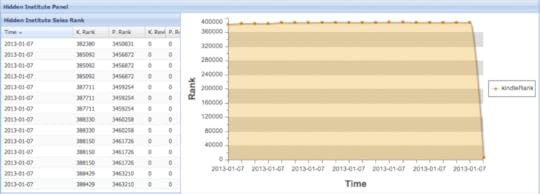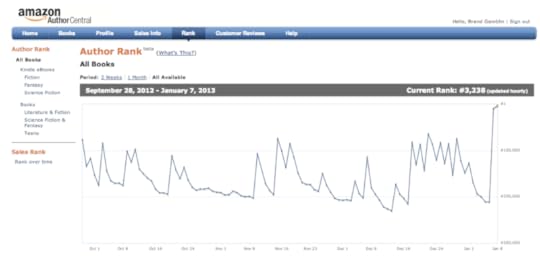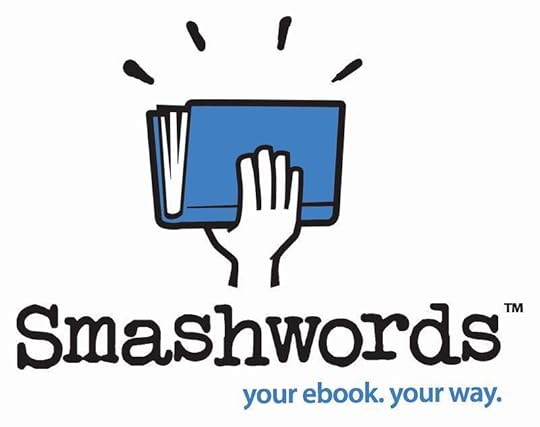Brand Gamblin's Blog, page 5
January 9, 2013
My First BookBub Promotion
 Recently, I signed up with a company called “BookBub” that is essentially a huge mailing list of books on sale. I promoted my book “The Hidden Institute” on there, dropping the price to $0.99. For sci-fi books selling for under a dollar, the cost was $120 to mail an ad to 90k subscribers who had expressed an interest in sci-fi. If I got even half of one percent of their subscribers to buy my book, the ad would pay for itself.
Recently, I signed up with a company called “BookBub” that is essentially a huge mailing list of books on sale. I promoted my book “The Hidden Institute” on there, dropping the price to $0.99. For sci-fi books selling for under a dollar, the cost was $120 to mail an ad to 90k subscribers who had expressed an interest in sci-fi. If I got even half of one percent of their subscribers to buy my book, the ad would pay for itself.
Goals
Before we start talking about numbers, let’s look at everything I hoped to accomplish with this ad.
Profit – If I sold more than half of one percent of their subscriber base, I would be looking at quite a bit of profit from the ad.
Amazon Rank – Selling a few copies a month was keeping my book in the #300,000 range as far as Kindle ranking goes. I needed to find a fresh set of eyes to sell to, so that the book could get a higher ranking and, consequently, more organic sales.
Readers – This is the big one. My main goal, whether I’m selling the book or not, is to get it in front of people. The true purpose of this ad was to get my book on as many e-readers as possible. In a lot of ways, I was thinking of this as “How much do I have to pay, per book, to get the book in the hands of genre-targeted, motivated readers?”
Variables
You always hear the term, “Your mileage may vary.” So while my promotion may be a lot like yours, let’s look at the ways that this one could be different enough to keep the same thing from happening to others.
Sci-Fi. It’s a niche crowd. More than that, I was writing a Neo-Victorian story about manners in a futuristic world. It is kinda Steampunk, kinda Jane Austen. Very niche group. A more mainstream novel will probably see better results.
99 cents. My book was discounted to one buck, because I’m gearing up for the next book in the series, “Invito Rex”. I wanted as many readers as possible, so I slashed the price on the first book.
Monday. I don’t know why I didn’t think of this, but my promo came out on a Monday, which is probably not good for sales. I’m just guessing, but I think people are more likely to buy when the weekend is coming, and they think they have more time to read. Just a thought.
Echo Chamber. I have already pimped this book out to all my friends and family, to all my social media circles, and I even made a free podcast with the unabridged audio of the book. In short, I had already saturated my local circles. You may not have, which could affect your sales.
So, with that in mind, how did we do?
Results
On the first day (January 7th), the book was listed on their site, but it didn’t get any sales until the e-mails started getting sent around. The first of those sales started at noon (EST), and by 1700, forty copies had sold. So, for the first five hours, we were selling at 8 copies per hour. From 1700 to 1930, we sold another 54 copies, so just after work, people raised the average sales to 21 copies per hour.
By 0630 the next day, there had been a total of 120 sales, which means it sold two copies per hour all night. By 1930 on the 8th, we were at 180 copies, which means that it sold 4.6 copies per hour during the second day.
It is now midnight on the 10th, and we are at about 200 sales, which means we’ve dropped enough in sales for me to say that the promo is officially over.
So that means I sold 200 copies with this ad. The profit on 200 copies is $70, which means my total cost was $50. Now you can look at that and say “Damn, I spent $50 and I didn’t walk away with any profit!” However, I like to think of it as “I spent $50 to get my book into the hands of 200 interested readers.”
At that rate, I effectively spent around a quarter per book, which is less than the stamp it would have cost to mail the book to all those people.
And more importantly, 200 new people now had a copy of my book. That’s big.
Ranking
On the 7th, when the ad hit, the book dropped in Amazon rank from around 380,000 down to #1295 in total Kindle books. It was #18 in Kindle Sci-fi/Adventure, and #25 in Books Sci-Fi/Adventure. So that was pretty cool. here is a graph showing the level of difference that sale made:

Also, Amazon authors have their own ranking, which is actually more or less hidden to regular readers. My personal ranking went from around 210,000 to 5,000. So, outside of the individual book ranking, my personal ranking went up by a factor of about 42 times its normal value. So that’s pretty cool. It won’t last, but it’s pretty cool.

Conclusions
So, knowing that the promo didn’t make its money back, would I still want to do it again? Well, I paid 25 cents per copy to give my book to 200 readers who cared enough to buy in, so that’s a pretty big deal. I gained one new review (4-stars), and I significantly expanded my audience.
To put it another way, keep an eye out for “Discount Miracles” a book of mine that will soon be dropping its price for a new BookBub promotion.
January 8, 2013
A kind of Stopwatch
 Back in the 60′s, the Twilight Zone did an episode called “A kind of Stopwatch”. In that story (warning: spoilers) a man receives a stopwatch that can stop time for everyone except him. He tries to use it to rob a bank, and in doing so, breaks the watch. The story fades out with him trapped in a moment in time, alone for all eternity.
Back in the 60′s, the Twilight Zone did an episode called “A kind of Stopwatch”. In that story (warning: spoilers) a man receives a stopwatch that can stop time for everyone except him. He tries to use it to rob a bank, and in doing so, breaks the watch. The story fades out with him trapped in a moment in time, alone for all eternity.
In 1986, they tried it again, with Wes Craven directing an episode called “A little peace and quiet”. This time, it was a woman who finds a magic pendant and uses it to get her housework, shopping, and other (fairly sexist) duties done. When the air raid sirens go off, and she stops time to get a handle on the situation, she sees a nuclear missile frozen just a few dozen feet above her neighborhood.
I like that one better, because it leaves her in a worse predicament. Sure, she can start time again, but everybody would die if she did.
Anyway, I’ve been thinking about that story a lot, not because of the story itself, but because I think I know what would happen AFTER that story ends. I want to tell that story. What the woman would do, if she had stopped time right before nuclear war broke out. Insanity is certainly possible. Isolation would do a number on her, and the choice that she would face, every minute of every day (can we even use those measurements anymore?) would weigh powerfully on her.
I’ve got a story to edit, and I want to get started on the next sequel… but man, this would be a fun story to tell.
January 5, 2013
I love living in the future.
 So, a couple of days ago, I bought a new computer. Here’s how that worked. I read an article about an ultra-cheap, android system that plugs directly into your TV (called the MK-802). I went to Amazon and bought it for $35, with two-day shipping free (because I’m an Amazon Prime member). So, on Wednesday, I paid $35 for a computer, and on Friday, I got it in the mail.
So, a couple of days ago, I bought a new computer. Here’s how that worked. I read an article about an ultra-cheap, android system that plugs directly into your TV (called the MK-802). I went to Amazon and bought it for $35, with two-day shipping free (because I’m an Amazon Prime member). So, on Wednesday, I paid $35 for a computer, and on Friday, I got it in the mail.
It is slightly larger than a thumb drive, with cable connections all over it. I plugged it into the HDMI connection on my TV, then plugged it into the USB on my TV (for power), and boom. I had a working, hi-def Android system hanging off of my TV.
It’s a 1.0 Ghz system, with HD video encoder/decoder, a 3D GPU, runs flash up to 11.1, supports HTML5, has wireless access for 802.11 b/g/n, has half a gig of memory, with 4 gig of Flash storage.
It weighs 30 grams. Just think about that. This computer weighs 30 grams.
Okay, but it’s only Android, right? I mean, it’s not a real computer, right? You can’t play World of Warcraft on it, now can you?
No. But here’s what I can do. I can open Google Drive to do my writing on the cloud (on my TV). I can open spreadsheets using Google Docs. I can read and edit Word Docs through Android apps. I can play any music available either on my cloud drive, or from Spotify’s incredible collection. I can play Angry Birds. I can do my finances on my TV, because every bank and credit union I work with has their own app, not to mention Mint, which consolidates them all. I can read my RSS feeds, I can read my e-mails from any account, I can read my Google Plus stream, I can read any book I’ve stored on Kindle.
Right now, there is only one thing (ONE) that I need my powerful desktop system for. And that is editing video, which I haven’t done in months. There is only one thing (ONE) that I need my laptop for. And that is editing audio (which I do a bit more frequently).
For all my day-to-day stuff, I bought a computer for $35 that can do it all.
Oh, and when I go on holiday to visit the family, I can just yank the computer out and bring it with me. I have enough games on there to keep any kids happy. I can share all the family photos on my relative’s TV. I can still check my social media connections on a system that isn’t big enough for the TSA to tell me to scan it separately.
If this isn’t living in the future, it’s a pretty amazing approximation of it.
January 2, 2013
The Amazon Tax
 Recently, someone asked where they could find new authors, and new e-books. I jumped at the opportunity, wrote down a description of two of my books, and put up links to the Gumroad pages for them.
Recently, someone asked where they could find new authors, and new e-books. I jumped at the opportunity, wrote down a description of two of my books, and put up links to the Gumroad pages for them.
Gumroad
Now let me back up a minute, because I know some people aren’t familiar with Gumroad. If you already are, feel free to skip ahead. You see, Gumroad doesn’t deal in books, e-books, publishing, or any of that. All they do is distribute digital files, and they do it really well. They handle payment systems better than Amazon (they can take purchases from anyone in the world, and they don’t have different sites for different countries), they fulfill the digital orders well, and they even provide a good storefront for the producer.
Better still, they only charge 5% (with an additional $0.25 per transaction). This means that, if I sell a book for $4.99, I only get $3.49 from Amazon, but I get $4.49 from Gumroad. That’s about 28% more money per sale.
But it gets better. What I sell on Gumroad is a zip file that has ALL the formats. On Amazon, you only get a mobi file, but on Gumroad, you get everything. Mobi, EPub, PDF, RTF, TXT, HTML. And all of it DRM-free. When you buy from Gumroad, no one can ever take it away from you.
So Gumroad is better for the reader, it’s better for the author, it’s better for everybody. But let’s get back to our story.
The 800-pound Gorilla
After I put up the links to my books on Gumroad, the person who was asking where she could find new books said, “Oh, I found it on Amazon for only $3.82!” So she bought it there. Even when I provided a link to the system that worked better for more people in more places, she chose to buy it from Amazon, partially because it was cheaper.
But why is it cheaper? Where did that $3.82 come from? I wondered the same thing. I’m self-published, and as such, I make my own prices on the things that I sell. For some reason, though, Amazon decided to cut my price by 23% without asking or informing me. It just happened one day, and nothing I did could change it. So I’m stuck with it. The options they are apparently giving me are :
Suck it up, cupcake. If you want to work with Amazon, you work with their rules. They don’t have to explain it to you. They don’t owe you a thing.
Pull the book. Sure, you can make all your sales on Smashwords and Gumroad. Ha! You know that 90% of your sales come from Amazon. You’re shooting yourself in the foot if you try to leave us.
I want to encourage people to use Gumroad. I want to encourage them to use Smashwords. I want them to use iBooks and B&N and Google Play, and all the other places you can find the books. In short, I want to encourage diversity.
So I had this idea.
When a country wants to encourage a behavior, they use the monetary equivalent of the carrot and stick. They subsidize behaviors they like, and they tax those that they don’t. And while it might seem like hubris to compare myself to a nation, I believe I have a small amount of power over this little island of intellectual property. So roars the mouse.
I’m going to increase the cost of my books on Amazon until they match the profit that I get from other venues. If I only get 70% from Amazon, but 95% from Gumroad, then I will “tax” Amazon buyers by making them pay more to cover the loss. And wherever possible, I will point them to the safer, easier, cheaper, and more convenient buying opportunities out there.
With a book priced at $4.99 on Gumroad, I make $4.49 per sale. In order to get the same amount of profit from Amazon (at 70%), I would have to raise the price to $6.41. As much as I hate to do it, I feel like I have to take some step to get back that freedom for pricing, and to get consistent profit.
Besides, people are always telling me that they equate worth with cost, so this can only help my sales, right?
What do you think?
December 19, 2012
A nibble of “Invito Rex”
 I love editing this thing. It’s like, when I first wrote “Invito Rex”, I was worried about the story. Who the characters were, what they were doing. I got about ninety thousand words written, and it’s almost all story.
I love editing this thing. It’s like, when I first wrote “Invito Rex”, I was worried about the story. Who the characters were, what they were doing. I got about ninety thousand words written, and it’s almost all story.
Now that I’m doing the editing pass, I’m taking it slow. I know that I had a picture in my head of how the world looked in each scene, but I never bothered to write it down. Now that I’m going back through it, I’m describing people and places in a way that makes it jump to life. I’ve never enjoyed editing so much.
Here’s an example, something I finished working on just a few minutes ago. It deals with two of my favorite characters:
Across the street from the Westin Hills, two sterling emissaries of the lowest class looked up from their game of Circus to watch the young man enter. The darkened alcove they inhabited was lit by no more than a distant streetlight, which made their pieces look more shadow than substance on the circular board. The pressed-wood gameboard balanced precariously on top of a corrugated steel barrel, rusted through at the bottom. From beneath their laborer’s caps, neither could see the other’s face, though that was hardly a bother for two who were so familiar with each other. They had worked side-by-side for so many years, they were more family than friends. They were brothers in every aspect, other than genealogy.
They looked to be complete opposites, two sides of the coin. One short and stout, with a bushy beard that ran from his ears to his shoulders. The other tall and wiry, more akin to a perching bird than a man. He had his knees pulled up under him so that he rested upon his feet while sitting on the dumpster. He hugged his knees as he watched the flashy young man enter the hotel.
The wider of the two shook his head and looked back to the game. He took a lance with his book and kept the dirty, wooden piece in his hand. Scratching his bushy beard with the piece, he said, “See that, Lou? Nobs in our midst.”
His taller, thin compatriot nodded, his head bobbing like a melon on a spring, “Dunna be long now, Stan, ‘fore we have to get Sunday best, just to walk the street.”
The thicker man regarded him with small deep-set, shining black eyes, “Nah. Expect he’s just here for words wit’ her ladyship.”
Lou’s pale hand floated over to a glove, moving the piece out of danger and placing it behind a pair of lances, “Didn’t seem a proper lord, anyhow.”
The dark man raised a bushy eyebrow, “How do you figure, Lou?”
“Well, proper lord don’t travel alone.” He tapped the side of his long face, winking, “That’s logic, there, Stan.”
The bushy beard shook, leaving a brief cloud of dust, “Nah. Perception’s what that is, my duck. Logic’s when you figger on what kind of person, what ain’t a lord, walks around actin’ so?”
Lou’s thin hand snaked out to catch the circular board as it threatened to capsize, “Well, Stan, seems to me there’s two kinda folk, what ain’t a lord, but walks so.”
Stan leaned back against the grubby tenement wall and laced his fingers together over his stomach, “Enlighten us, great thinker.”
“There’s them what’s really got the patter down. I mean, covered tight, with not a jot out of place, and every p and q dotted.”
Stan nodded slowly, “And t’other?”
Lou shrugged, “Them what’s gonna die.”
Stan nodded sagely, “Now that, my friend, is logic.”
December 13, 2012
Google doesn’t like me anymore
 Google AdSense is a system that allows regular bloggers to host ads on their sites, or advertise their own products on other sites. Given that it’s a Google product, it’s one of the largest systems out there. And yesterday, I got kicked off of it.
Google AdSense is a system that allows regular bloggers to host ads on their sites, or advertise their own products on other sites. Given that it’s a Google product, it’s one of the largest systems out there. And yesterday, I got kicked off of it.
To give you a little background, I very rarely blog anything. I have a fairly popular YouTube show that I partnered with AdSense, giving them the right to put ads on the show, but I never really checked it. It was a passive income stream that, to be honest, made me no income at all. I got a card in the mail from Google, offering me $100 in ad promotion revenue, and using that, I determined that ads didn’t help me sell my stuff at all. I’d basically forgotten that it existed.
Yesterday, I got an e-mail from them titled: Google AdSense Account Disabled. The text was very friendly and polite, talking about how they wanted to create an online ecosystem that benefits publishers, advertisers, and users. They said that they had detected “invalid activity” on my site, and that my account was disabled.
Well, I don’t have any ads on my site, so I was pretty sure that was a mistake. After all, I can’t very well be creating a click farm if I don’t have any ads to click.
It’s worth noting that they could not tell me what my infraction was. “We’re limited in the amount of information we can provide about your specific violation. We understand this can be frustrating for you, but we’ve taken these precautionary measures because intentional violators can use this information to circumvent our detection systems.”
That makes sense, but at the same time, I can’t defend against actions that I can’t identify. I might as well go to them in an appeal and say, “But I never clubbed any seals!”
But I’m a Google person. I love G+, I was one of the first to get a GMail account, so of course I don’t want them to think I’m some kind of dirty … um … bad guy? So I appealed the ruling.
An arbitrary ruling made without telling the accused of his crimes was now being appealed without any idea of what infractions I was defending. The appeal asked some basic questions (“Have you ever bought clicks?” “Describe your advertising strategy”) and I basically told them that I never even used AdSense. I received an auto-recognition e-mail, stating very politely that they would re-evaluate my case.
This morning, I was told that, no, they were going to keep it disabled. “Thanks for the additional information provided in your appeal, we appreciate your continued interest in the AdSense program. After thoroughly reviewing your account data and taking your feedback into consideration, our specialists have confirmed that we’re unable to reinstate your AdSense account.”
The only reason I’m not screaming bloody murder about this is the fact that I never even used AdSense. It’s no big deal to me.
At the same time, what if this was for my Google Account? All my GMail, all my Google Drive data… It’s basically a cautionary reminder to me that I need to get off the cloud ASAP.
The cloud has no rules. It can distribute your data as it wishes, and it can shut you down without needing to tell you why. The cloud has no laws, and it can ruin your life if you depend on it.
In the meantime, I’ll be backing up all my Google data, just in case.
December 4, 2012
Charlotte Bronte’ improved my writing tonight.
 So, Allison convinced me to read a bit of Jane Eyre each night, before I sit down to edit “Invito Rex”. It’s made a huge difference in my writing. Check this out:
So, Allison convinced me to read a bit of Jane Eyre each night, before I sit down to edit “Invito Rex”. It’s made a huge difference in my writing. Check this out:
“As the boy becomes the man, so he must bear new burdens of sufferance and sacrifice. A monarch’s duties are, I find, no more heavy than those of a common man; they are, however, more devastating in the breadth of their effect. It is, therefore, with a heavy heart that I must commit these words, that they be recorded truly, and I pray, never acted upon.
My trueborn son shines in my heart as the light of all my days. He grows stronger and wiser with each passing moment and yet, I must prepare for the most dire of circumstances. A king cannot leave a mote of future in the hands of chance. He cannot let any situation rest in the hands of hope. I am not unaware of my situation, last of my line, with only one son of my name. If there be any justice, the kingdom will never need more than that.
But if there is tragedy where justice should reign, we must be prepared. My boy is young, and has no royal consort. He dallies with no mistresses, and the arrangements for his marriage are too distant for consummation. My boy, Cadvan, is true to his station, and will surely rule well, providing his own progeny. And while my heart rests on this hope, my mind flies to the obvious opposing view.
Faith is small hope for a mortal man planning his demise. But a king’s duties require that he protect his country, even after his last breath. I must, therefore, add another to the line of succession, a byblow shame who shall sit just below my boy Cadvan. Should abdication or misadventure rob the nation of my noble family, my dishonor shall protect our line.
Should the fates show love of our nation, these words need never be read; my ignominy will live in quiet peace. But if duty removes him from his freedom, let him know I was unwilling. Let him know that I have viewed him from afar, and protected him as well as a shamed stranger could.
If God is good, let the boy forgive me.”
— Excerpt from the Will of King Richard
November 6, 2012
Are you on Smashwords?
 Something strange happened to me yesterday. I was reading through Google+ when I saw someone ask, “Are there any Indie e-book authors I can throw money at?”
Something strange happened to me yesterday. I was reading through Google+ when I saw someone ask, “Are there any Indie e-book authors I can throw money at?”
Now, an offer like that is music to my self-promoting ears. So, I responded in the comments, adding links to my books on Amazon, with short synopsis of each. She responded with, “Those sound great, but I don’t think Amazon Germany will take PayPal. Are you on Smashwords?”
So, let’s stop here for a minute. Of course, I sent her a link to my books on Smashwords, but that’s not the point. The point is that a reader asked, specifically, for a distribution format… and it wasn’t Amazon.
My father used to say, “If you see something happen to one person, chances are it’s happened to a hundred people that you didn’t see.” If there’s one person who’s asking for Smashwords, presumably, there are a hundred who feel the same way, and just aren’t asking.
Now don’t get me wrong. I know the plural of an anecdote does not equal a fact, but it was enough to stop me because I’d been considering going completely Amazon Select. If I want to make 70% in India, I need to be in Amazon Select. If I want in on the borrowing bounty, I need to be part of Amazon Select. And if I’m giving away the other versions to everyone who buys through Amazon, then I’m still supporting the other e-readers, right?
Well, according to this… no. From this incident, I’ve been shown that Amazon, ubiquitous as it is, doesn’t cover everyone.
Now please understand, I’m not biased on distribution. I’m not Mark Coker, trying to lure you away from the evil Amazon. I’m a writer, and as such, I don’t have a dog in that fight. My job is to put my book in as many hands as possible, and from what I just saw, Amazon exclusivity will not get me that.
Amazon Select just became an obstacle to sales.
October 25, 2012
Invito Rex is finished!
Okay, not a hundred percent. I still have to fill in a few chapter headings, and I want to let it sit for a bit, and I need to edit it a couple of times, and then send it to a real editor, etc, etc. Still, I’m hoping I’ll be able to get it out there by January or February of next year.
So what is next for Invito Rex? Well, for now, I’m going to let it sit. They say you should step away from a story for a while before you do any edits. November will be my month. I have this idea for creating collectible cards based on characters from my stories, and I want to spend some time on that. Also, I need to record “Discount Miracles” as a podiobook, so that’s on the list.
When I come back to it, though, I’m probably going to do another Kickstarter. Not for the book itself, mind you, but for the cover art and editing. The last time I did a Kickstarter for a book, I got more than my goal, so this time I think I’m going to have an even better chance of funding the enhancements.
For one thing, I’m going to be working on those collectible cards. I don’t want to say too much about those yet, but I’d like to have special Dizzy and Cliffy collectible cards available for backers.
For another thing, I’m going to have the game of Circus done by then. Circus is my personal variant of chess, which involves a circular board. At a certain level, backers will receive a free copy of the game.
Also, I’ve talked to a few authors about doing short stories for me as stretch goals. So if we reach the main goal, we will get the main book, but if we get higher, we will have extra content telling the stories of (for instance) ronin knights in a neo-Victorian world, fraternities in the Hidden Institute, and possibly a story about the secret world of the silks.
But that’s all for later. For now, let’s just take a moment, take a breath, and play some video games.
October 3, 2012
New sample from Invito Rex
I just finished this chapter heading, which gives a bit of future history about my neo-Victorian world:
It was Abigail Kovacs who made the first Kovacs engine, of course. She started it out in 2070, with a team of engineers, and plans for a self-contained engine that could be sold commercially. When asked about it, she told the world bluntly, “I want my house to fly.”
She made the news at first for the humor, but when her engine reached the point where it was self-sustaining, people stopped laughing. The engine looked like a tall, thick cylinder, with fusion generators, wind turbines, and solar collectors wrapped around it. The central cylinder sucked air in from above the unit, and out through the bottom. It was little more than a directionless jet engine, but it shocked the world because it could run, without maintenance, for a hundred years, and could hold twice its weight in ballast. She mounted several of them to the perimeter of a platform, and built a house on top. Again she made the news, with pictures of her beaming face and a flying house hovering over a Kansas City field behind her. Sales of her engines took off.
People started replacing stilt houses with Kovacs. They started building lake houses hovering over the lakes. They were still remarkably expensive, but with the influx of cash, Abigail was able to build on her platform, extend it to allow other buildings, and improve on the engines. In 2079, Abigail announced the first Kovacs-powered city, with a population of only two-hundred. The platforms held shops and restaurants, hydroponic gardens and homes, and every hotel had a view of the wide expanse of land around them.
By then, the government was ready to take her seriously. They started investigating wether her city violated zoning laws and airline regulations. Environmentalists started questioning whether she was affecting the jet stream, and what damage could be done by blasting air down on a countryside constantly. An outpouring of public support coupled with her impressive legal team to keep the regulations from shutting her city down, but she was never one to wait on others for permission.
In 2085, Abigail Kovacs had engines mounted at a 45-degree angle along every edge of her city’s platform. A year later, when construction was finished, she flew the city out over the ocean, to uncontested land, where no government could touch them. By that time, the city had grown to more than five-thousand people, and they all stood behind Abigail and her dream. She was still in litigation with the mainland of America when the Western War started.
In 2117, when the economic meltdown dissolved most major nations, the Kovacs city remained largely untouched. It seemed an unintended blessing that the city had become self-sufficient, and able to survive a devaluation of all terrestrial currency. However, as family members were brought on board, saving them from the hunger and homelessness of the mainland, they brought with them their prejudices. Every nation who had been fighting with sanctions and devaluation brought their hatred for the other nations that had devalued their own money. Each saw their neighbor as a tyrant, trying to pull them into slavery.
Many say it was a blessing that Abigail died in 2120. She did not live to see her dream literally torn apart by imported nationalism. The city was torn by looters, rioting, and infighting. People began to break off sections of the platform, announcing that they were keeping their section “pure”. One section was disconnected from too many other engines and dropped into the ocean, killing hundreds.
By 2125, the Kovacs city was reduced to a series of city-states that moved to remote sections of the world. Some continued to grow, becoming important financial centers in themselves (The New Chicago Kovacs, for instance, is considered a tax haven for the most affluent), while others have specialized in agriculture (The Bremen Kovacs is well known for it’s fifteen layers of hydroponic crops, hovering off the Western shore of Dakhla).
Many of the rich and famous still buy Kovacs engines for a floating house, but the stories of whole flying cities is generally discounted as a logistical impossibility from our distant past.
- Excerpt from “Man and his sky” by Cary Stefanek



